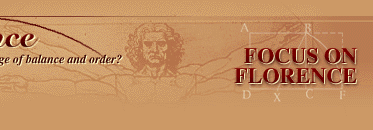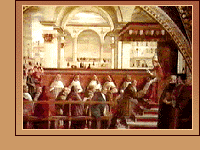 
Florence and Tuscany The
Florentine Republic |

The humanist movement was strong in Florence. Cosimo de Medici, Florence's wealthiest and most influential citizen, studied the works of ancient authors and collected manuscripts of classical writings. His delight in discussing humanist issues led him to organize the Plato Academy, where intellectuals would gather to discuss ideas concerning the classics. The academy continued even after Cosimo's death.
The Florentines enjoyed many pleasurable diversions from business and intellectual life. Lorenzo de Medici, Cosimo's grandson who was known as "The Magnificent," influenced the types of entertainment held and often sponsored the activities. Mystery plays, based on the theme of the Passion (the sufferings of Jesus), were regularly staged for the enjoyment and edification of the citizens. To celebrate the feast day of Saint John, Florence's patron saint, Florentines held a horse race that ran throughout the city. And festivals held during the season before Lent--called Carnival--were grand productions, especially in the late fifteenth century. Savonarola and Spiritual Concerns Although the humanist movement in Florence was very strong, Florentines were also concerned about their spiritual lives. Thus, amidst their prosperity, a preacher named Savonarola was able to change the thinking of many citizens. Savonarola was concerned about what he considered abuses by the church and about people's excessive interest in material goods. He preached against the accumulation of worldly possessions and called for a "bonfire of the vanities" in which people were to burn "immoral" paintings, cosmetics, and such entertainment-related items as musical instruments and playing cards. Savonarola was successful in convincing many Florentines to return to a more spiritual way of life. However, his condemnation of church abuses of wealth led to his downfall. The Pope restricted Savonarola from preaching; when he continued to do so, he was excommunicated. Soon after, Florentines turned against him for what they saw as his role in an unfavorable political climate. He was publicly executed in 1498. Read about Florentine art and architecture.
| |||||
